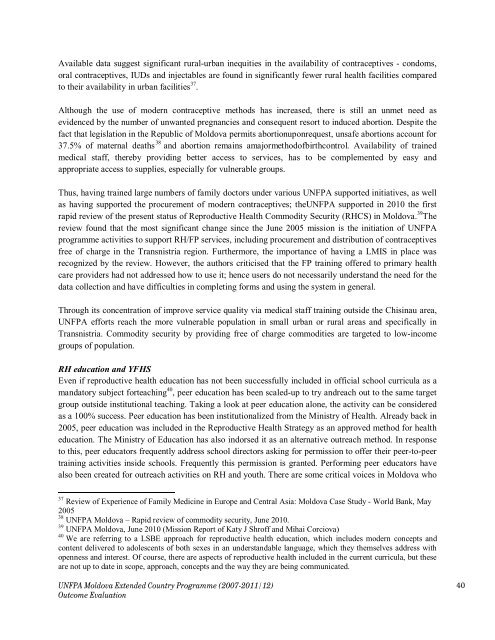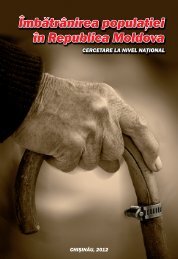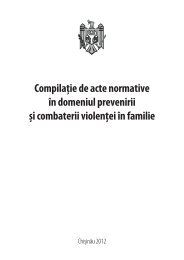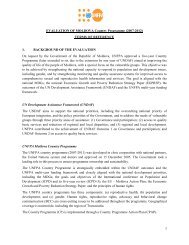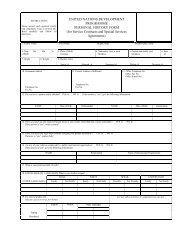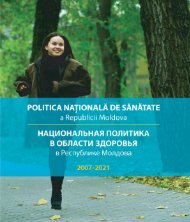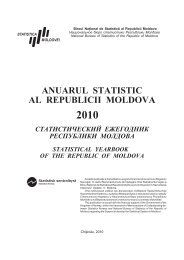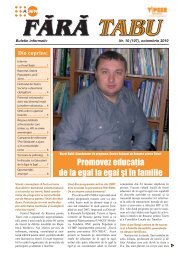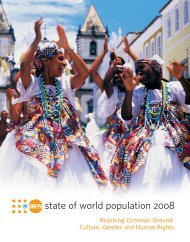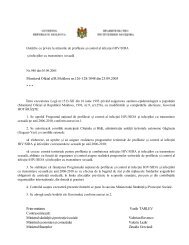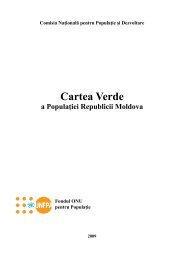Country Programme (2007-2011/2012) evaluation - UNFPA Moldova
Country Programme (2007-2011/2012) evaluation - UNFPA Moldova
Country Programme (2007-2011/2012) evaluation - UNFPA Moldova
You also want an ePaper? Increase the reach of your titles
YUMPU automatically turns print PDFs into web optimized ePapers that Google loves.
Available data suggest significant rural-urban inequities in the availability of contraceptives - condoms,<br />
oral contraceptives, IUDs and injectables are found in significantly fewer rural health facilities compared<br />
to their availability in urban facilities 37 .<br />
Although the use of modern contraceptive methods has increased, there is still an unmet need as<br />
evidenced by the number of unwanted pregnancies and consequent resort to induced abortion. Despite the<br />
fact that legislation in the Republic of <strong>Moldova</strong> permits abortionuponrequest, unsafe abortions account for<br />
37.5% of maternal deaths 38 and abortion remains amajormethodofbirthcontrol. Availability of trained<br />
medical staff, thereby providing better access to services, has to be complemented by easy and<br />
appropriate access to supplies, especially for vulnerable groups.<br />
Thus, having trained large numbers of family doctors under various <strong>UNFPA</strong> supported initiatives, as well<br />
as having supported the procurement of modern contraceptives; the<strong>UNFPA</strong> supported in 2010 the first<br />
rapid review of the present status of Reproductive Health Commodity Security (RHCS) in <strong>Moldova</strong>. 39 The<br />
review found that the most significant change since the June 2005 mission is the initiation of <strong>UNFPA</strong><br />
programme activities to support RH/FP services, including procurement and distribution of contraceptives<br />
free of charge in the Transnistria region. Furthermore, the importance of having a LMIS in place was<br />
recognized by the review. However, the authors criticised that the FP training offered to primary health<br />
care providers had not addressed how to use it; hence users do not necessarily understand the need for the<br />
data collection and have difficulties in completing forms and using the system in general.<br />
Through its concentration of improve service quality via medical staff training outside the Chisinau area,<br />
<strong>UNFPA</strong> efforts reach the more vulnerable population in small urban or rural areas and specifically in<br />
Transnistria. Commodity security by providing free of charge commodities are targeted to low-income<br />
groups of population.<br />
RH education and YFHS<br />
Even if reproductive health education has not been successfully included in official school curricula as a<br />
mandatory subject forteaching 40 , peer education has been scaled-up to try andreach out to the same target<br />
group outside institutional teaching. Taking a look at peer education alone, the activity can be considered<br />
as a 100% success. Peer education has been institutionalized from the Ministry of Health. Already back in<br />
2005, peer education was included in the Reproductive Health Strategy as an approved method for health<br />
education. The Ministry of Education has also indorsed it as an alternative outreach method. In response<br />
to this, peer educators frequently address school directors asking for permission to offer their peer-to-peer<br />
training activities inside schools. Frequently this permission is granted. Performing peer educators have<br />
also been created for outreach activities on RH and youth. There are some critical voices in <strong>Moldova</strong> who<br />
37 Review of Experience of Family Medicine in Europe and Central Asia: <strong>Moldova</strong> Case Study - World Bank, May<br />
2005<br />
38 <strong>UNFPA</strong> <strong>Moldova</strong> – Rapid review of commodity security, June 2010.<br />
39 <strong>UNFPA</strong> <strong>Moldova</strong>, June 2010 (Mission Report of Katy J Shroff and Mihai Corciova)<br />
40 We are referring to a LSBE approach for reproductive health education, which includes modern concepts and<br />
content delivered to adolescents of both sexes in an understandable language, which they themselves address with<br />
openness and interest. Of course, there are aspects of reproductive health included in the current curricula, but these<br />
are not up to date in scope, approach, concepts and the way they are being communicated.<br />
<strong>UNFPA</strong> <strong>Moldova</strong> Extended <strong>Country</strong> <strong>Programme</strong> (<strong>2007</strong>-<strong>2011</strong>/12)<br />
Outcome Evaluation<br />
40


